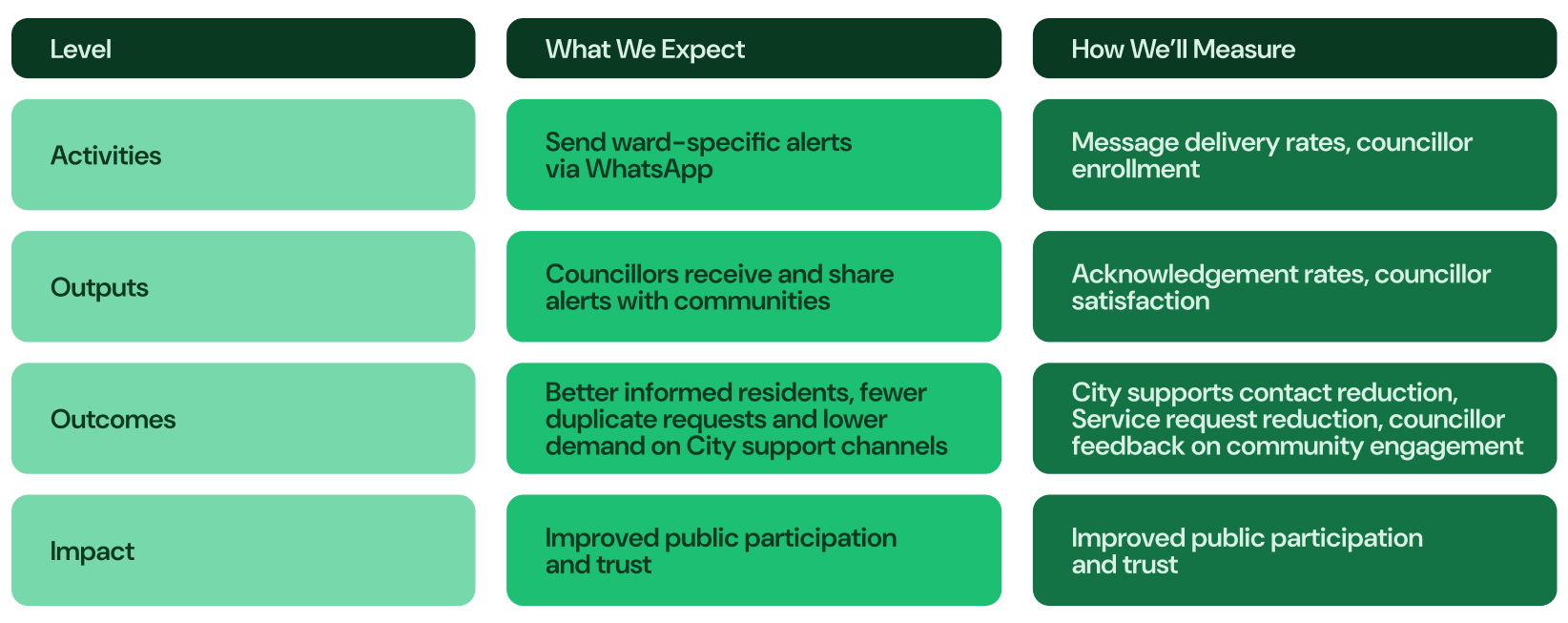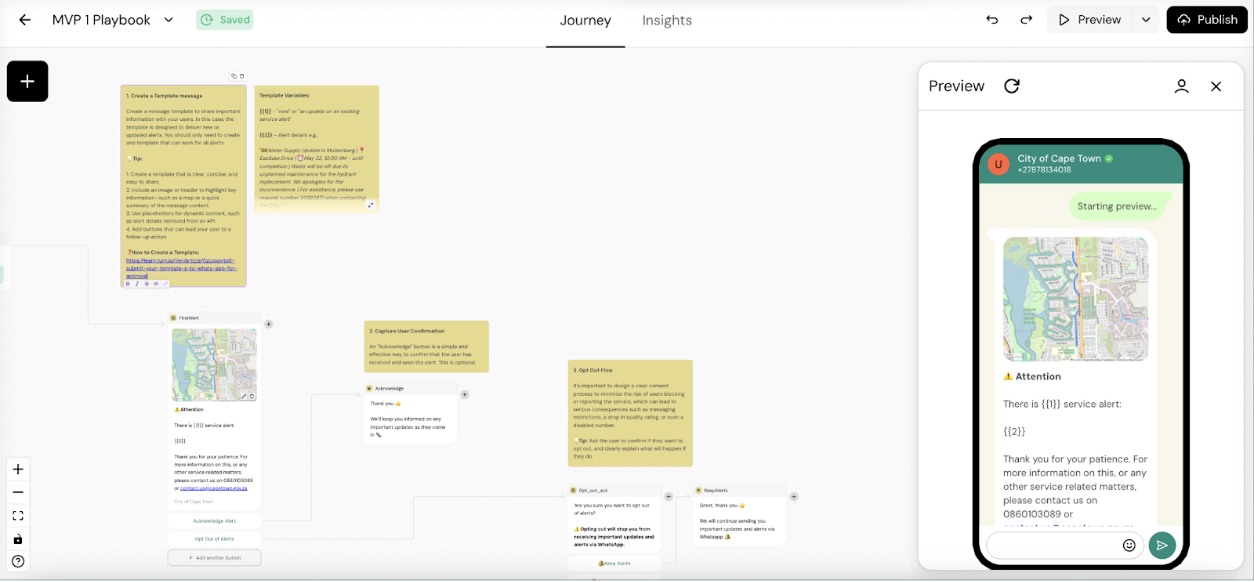
Empowering Local Communities in Cape Town

To improve transparency, responsiveness, and resident trust, the City of Cape Town in South Africa developed a pilot study for a WhatsApp-based Targeted Service Alert system for its ward councillors. The system integrates with existing municipal data infrastructure to automatically deliver hyperlocal alerts, such as planned water or power outages.
Impact in numbers
116 Wards
Partners: City of Cape Town, Turn.io, The Rockefeller Foundation
Use Case: Hyperlocal Service Alerts via WhatsApp
Focus: Public participation, WhatsApp communication
Use Case: Targeted Service Alerts
Public Participation Focus: Dissemination and transparency, empowering local
communities
Summary
This pilot is a collaborative initiative between the City of Cape Town, Turn.io, and The Rockefeller Foundation to enhance the delivery of critical local information to residents through trusted community intermediaries.
To improve transparency, responsiveness, and resident trust, the City launched a WhatsApp-based Targeted Service Alert system for its ward councillors. The system integrates with existing municipal data infrastructure to automatically deliver hyperlocal alerts—such as planned water or power outages—via WhatsApp. A large language model (LLM) transforms technical service data into clear, actionable messages that councillors can easily understand and forward to their communities.
This pilot is designed not just to solve a local communication challenge but to offer a replicable model for other cities exploring how to strengthen service delivery, reduce contact centre load, and deepen public trust through scalable, human-centred messaging solutions. WhatsApp is already widely used in many cities across the Global South, making it an ideal channel for inclusive and efficient public communication.

Theory of Change
By enabling councillors to receive timely, hyperlocal updates through WhatsApp, the City strengthens its role as a trusted provider of municipal services. Councillors are notified directly and can proactively share critical information with residents or community groups.
This approach both deepens councillor-constituent relationships and leverages those networks to ensure important updates are delivered quickly and clearly, supporting more informed, engaged, and resilient communities.

Problem statement
Ward councillors can find out about service outages and maintenance through various City
channels, but this takes time and effort. They're busy people who have to check multiple
platforms, dig through emails, or wait for official updates. By the time they get the
information and share it with residents, residents have already been affected by the service
issues.
This delays communication and makes councillors reactive instead of proactive. The
goal is to remove these delays and make it as easy as possible for councillors to stay
informed and quickly share updates with their communities.
Objective
To ensure councillors have timely, accurate service alerts that they can easily understand and forward to residents, strengthening trust and improving service communication at the local level.
Target Users
Ward Councillors: Elected officials are mandated to serve as intermediaries between the City and communities, uniquely positioned to amplify critical alerts and listen to feedback.

Metrics
Cape Town's 116 wards represent the city's entire municipal area, with each ward councillor directly elected to serve the communities that make up the ward. Full deployment could potentially reach many thousands of individuals, depending on the specific ward and representative.
Platform Metrics
- Message Delivery Rate: Percentage of alerts successfully delivered
- Acknowledgement Rate: Percentage of councillors who acknowledge alerts
- Rollout Adoption: Participation rates across phases (4 → 50 → 116 councillors)
- User Engagement: Total number of active users
- Message Response Types: API vs Journeys
Impact Metrics
- Service Contacts: Reduction in contacts to City support channels, such as the call centre, or social media channels.
- Service Request Duplication: Reduction in duplicate requests from areas with active councillors
- Councillor Satisfaction: Regular check-in feedback on usefulness and clarity
Optional Tracking
- Alert forward rates (where possible)
- Time between delivery and engagement
- Opt-out rates and reasons
Learnings
1. WhatsApp Business Account Setup
Setting up a new WABA in a city that already has multiple active instances is complex and potentially disruptive.
- This highlights the need for clear ownership, internal mapping of digital assets, and coordination with IT and comms teams before provisioning new instances.
Lesson: Map and manage digital assets early. Align across all internal chatbot owners before proceeding.
2. Stakeholder Management
Cities are sprawling, and often multiple departments are experimenting with similar or complementary digital tools
- Coordination takes time. Expect delays due to red tape, unclear internal responsibilities, and diverging departmental goals.
- Establish early champions within departments and maintain open lines with IT, communications, and service delivery teams.
Lesson: Invest in internal diplomacy. Alignment takes longer in government—factor that into timelines.
3. Planning & Theory of Change
Even a lightweight theory of change helped guide the pilot:
- The team outlined high-level outcomes and back-cast practical steps, which provided a compass for product iterations and stakeholder engagement.
Lesson: Don't wait for a perfect plan—just have a clear rationale and hypothesis.
4. Build Iteratively
- Building prototypes upon existing infrastructure (e.g. Service Alerts Connector) accelerated development.
- Prototypes helped get buy-in from departments and facilitated co-design discussions with councillors.
Lesson: Show, don’t just tell. MVPs build trust and invite collaboration.
5. Messaging Constraints
- Extending existing tooling or workflows is quicker than building from scratch on a new platform.
- The CoCPT utilised an existing data pipeline to provide much of the business logic, along with the Turn API, to access specific functions (e.g., message sending), thereby quickly creating the MVP.
- Outbound WhatsApp message frequency needs to be considered as it impacts the quality rating of the WhatsApp Business Account.
- Create templates that are clear, brief, and easy to re-share and resemble the current alerts for better recognizability and easier integration with API
Lesson: Keep messages short, human, and structured. Respect WhatsApp's policies and constraints.
6. User Testing
The team conducted interviews and light-touch testing with administrative officials and councillors to:
- Identify the most relevant types of alerts.
- Understand how councillors prefer to receive and share information
- Prioritise usability, simplicity, and relevance over technical novelty
Lesson: Councillors are pragmatic—tools must fit into their fast-paced, people-facing work.
7. Consent
- It's important to design a clear consent process to minimise the risk of users blocking or reporting the service, which can lead to serious consequences such as messaging restrictions, a drop in quality rating, or even a disabled number.
- Considered accessible opt-in pathways, such as obtaining consent via WhatsApp after initial contact, email consent before WhatsApp contact, or using both approaches.
- Added an option for users to opt out of receiving alerts via WhatsApp at any time, with the ability to opt back in whenever they choose.
Lesson: User freedom is important. Always provide a clear way for users to opt out of messages, like alerts on WhatsApp. Just as easily, let them opt back in when they’re ready. This can help build trust.
Final Reflection
This pilot demonstrates the power of combining public sector data, AI translation, and trusted community intermediaries to improve service delivery. For other cities looking to replicate this model:
- Start small, show results, and build buy-in.
- Keep councillor workflows simple and mobile-first.
- Align early across departments and IT teams.
- Respect the messaging platform's policies.
- Design for scale, but stay rooted in the needs of frontline communicators.
The City of Cape Town’s pilot offers a practical, people-centred template for rethinking how municipalities connect with communities—using the tools they already trust.
Access Playbook in Turn.io
Demo of Turn.io Journey

.jpg)


